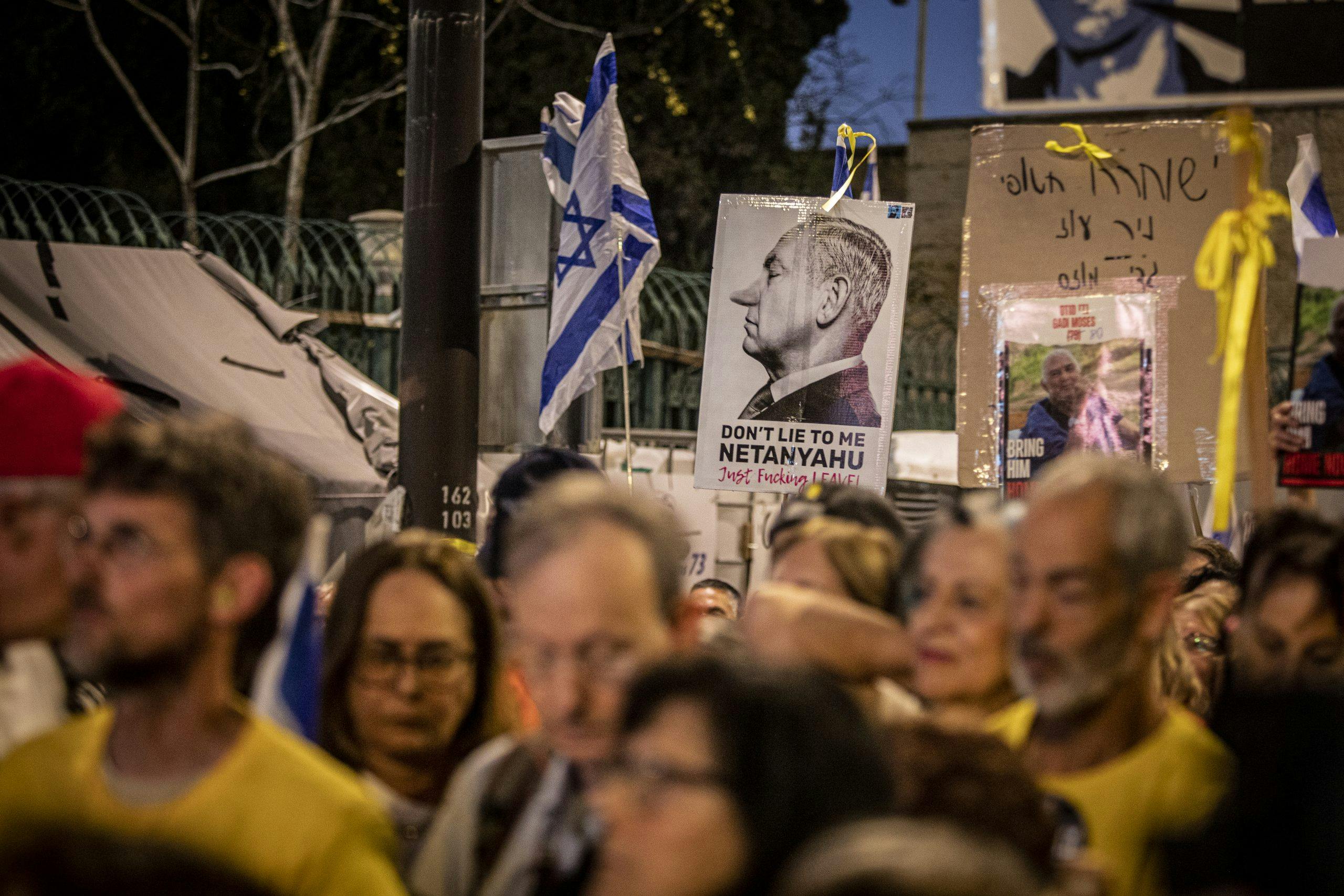Published: 7 May 2024
Last updated: 7 May 2024
In the shadow of the Gaza war, Benjamin Netanyahu’s government is intensifying a crackdown on freedom of expression that has thus far targeted primarily Arab citizens, rights groups say.
Right-wing politicians and activists say a tougher approach is needed in the face of what they argue is a heightened threat to Israel in the aftermath of the Hamas onslaught of October 7.
But legal and civil rights groups Adalah, the Legal Center for Arab Minority Rights in Israel, and the Association for Civil Rights in Israel (ACRI), are voicing alarm. They claim state attorneys, right-wing groups, police and Knesset legislators all appear to be working to increase suppression of social media posts and expressions they allege constitute incitement.
Of immediate concern is the ongoing police interrogation of Haifa-born Palestinian academic Nadera Shalhoub-Kevorkian, a scholar of law and criminology at Hebrew University, on suspicion she violated anti-incitement legislation.
Shalhoub-Kevorkian has termed the pulverising army offensive launched after Hamas’s brutal incursion a genocide and called for the end of Zionism.
Following the Hamas attack, the Israeli army has killed more than 34,000 people in Gaza, the vast majority women and children, according to the Hamas-run health ministry, and pushed the northern part of Gaza into a fully-fledged famine, according to international health specialists.
Israel says it upholds international law and that Hamas uses civilians as human shields. It has not specified a tally for the total number of fatalities among Palestinians but even its allies have voiced criticism about the way it is waging the war.
Within Israel, insecurity prompted by the Hamas attack, the uncertain fate of hostages and exchanges with Hezbollah on the northern border is dominating the public’s attention. This, rather than damage to freedom of expression, is preoccupying many of those who, before October 7, took to the streets to oppose what they saw as steps by Netanyahu to move Israel towards authoritarianism.
"If we had hope that they would let go of the judicial overhaul, they haven’t. It’s just not as vocal and visible."
Karen Saar, spokesperson for ACRI
Shalhoub-Kevorkian said in a recent podcast that while Israelis depict themselves as victims, it is clear their intention is “getting rid of Palestinians”. She used the Arabic word for body remains, ashla, as her point of reference.
She said she is not denying that “something bad happened on 7 October” but stressed that “they want to see ashla. We’re bringing the ashla back to life by talking about it, writing about it.”
In her sixties, the professor was arrested at her home on April 18 and according to lawyers, was meted out harrowing treatment while being kept in a bitterly cold cell overnight before judges ruled there were no grounds for her arrest. However, a police investigation against her is still being pursued.
Israeli police did not respond to a query requesting specifics on the causes of the interrogation or answer any other queries for this article. The state attorney’s office, which approved the investigation, said all queries should be directed to the police.
Adalah says Shalhoub-Kevorkian is being questioned about her academic research. “This could set the stage for further arrests of Palestinian faculty members at Israeli institutions,” said Adalah spokeswoman Miriam Azem.
Outside Shalhoub-Kevorkian’s remand hearing, police broke up a peaceful protest. This correspondent witnessed police grabbing the loudspeaker from someone who was leading chants of “No to the police of Ben-Gvir”, a reference to the virulently anti-Arab minister for national security.
They also forcefully shoved demonstrators, including a Jewish Hebrew University student who held up a sign that said “Free Nadera” on one side and “Gazans are humans” on the other.
It’s not just the police who are muscling in. Right-wing legislators have drafted an amendment to the 2016 Law for Combatting Terrorism that effectively lowers the bar for what constitutes punishable incitement. “This could significantly broaden the number of people prosecuted,” says Karen Saar, the spokesperson for ACRI.
“If on October 7 we had hope that they would let go of the judicial overhaul, they haven’t. It’s just not as vocal and visible,” Saar said.
In a step with implications for media freedom, Attorney General Gali Baharav-Meira last week determined the cabinet can go ahead with banning the Qatari Al-Jazeera television station’s operations in Israel as a follow up to recent passage of a law enabling closure of foreign outlets deemed to threaten national security, Israel’s Kan public broadcaster reported.
Al-Jazeera’s broadcasts stress Hamas's views but it also provides the most intensive coverage of Gaza, where Israel has barred the free movement of foreign journalists since the start of the war.
"We face a lot of claims that we are inciting and supporting terrorism. It’s not correct and we prove it."
Mohammed Magadli, News editor, Nazareth's Nas radio
A total of 153 Palestinian citizens of Israel and East Jerusalem residents have been indicted since the October 7 Hamas attacks for allegedly violating an anti-terrorism law, with students also hard hit in terms of university expulsions and other disciplinary actions that are followed up by police investigations, according to Adalah.
It argues that this is a political campaign to stifle free expression and chill legitimate criticism. In some cases, students were pursued just for posts that voiced solidarity with Gaza residents, said Azem.
Mohammed Magadli, news editor at Nazareth’s Nas Radio, says the term incitement is often being used misleadingly by Israeli Jewish journalists and social media influencers in a bid to silence Arab journalists “who don’t align with the Israeli narrative”.
“We face a lot of claims that we are inciting and supporting terrorism. It’s not correct and we prove it. Sometimes people will just take a sentence and mistranslate it,” said Magadli, who is also a political commentator on the Hebrew-language TV station Channel Twelve.
In the short run, what Magadli calls “suppression” of free expression causes fear among Arabs about speech and writing, he says. In the long run it could fuel violence, he warns. “Because they prevent us from speaking, I fear that things could break out in another way,” he told TJI.
Leading human rights lawyer Michael Sfard concurs that Arab citizens are sometimes being pursued for “benign statements of support or solidarity with Gazans”. There have also been posts that “provided context for the Hamas attack and sometimes supported it,” he says.
“The fact that I dislike or detest statements doesn’t mean there are grounds for arrest,” Sfard adds. “That is freedom of speech.”
But the chill effect is already reaching Jewish Israelis, with left-wing groups that want to sharply criticise the war now seeking Sfard’s legal advice before making posts, he says.
Elements on the right, however, are clamouring for more curbs. Im Tirzu, a hard-right student organisation, blames authorities for not doing enough to combat incitement.
“We report on incitement to the police and the universities,” Im Tirzu spokesman Matan Asher says, adding that the group had filed a complaint against Shalhoub-Kevorkian. “The problem is that she called to abolish Zionism, which is to destroy the state of Israel.”
"We are protecting democracy by acting to stop incitement."
Matan Asher, Im Tirzu spokesperson
Asher argues that Im Tirzu is protecting democracy. “If you look at the past you will find that democracy can get destroyed when a minority begins to act violently. We are protecting democracy by acting to stop incitement,” he says.
Likud MK Eliyahu Revivo, sponsor of the bill that will likely increase arrests, told TJI that October 7 “just strengthened our belief that all our enemies are coming to eliminate us”.
“If we had woken up earlier, the rise in incitement could have been blocked. Actually, what we are doing is the minimum that is required and it is too little too late.”
Sfard sees things differently: “Unfortunately, Israel today is a country that doesn’t adhere to basic principles of freedom of political speech,” he says. “If this government stays in power these trends will get worse and worse.”
RELATED STORIES
Netanyahu cabinet unanimously votes to shut down Al Jazeera in Israel (Haaretz)
Israel's communications minister lauded the decision as 'an end to the network's well-oiled incitement machine'; Israel Police raided the channel's Jerusalem office and confiscated equipment; Al Jazeera slammed the decision, calling it a 'slanderous and deceptive move'.
By shutting down Al Jazeera, Israel is shooting itself in the foot (Haaretz)
In shuttering the Qatari news network, Israel joins a distinguished club of Arab countries that have stopped Al Jazeera's operations. This move should worry Israeli media, which is prohibited from broadcasting independently from inside the Gaza Strip.





Comments
No comments on this article yet. Be the first to add your thoughts.